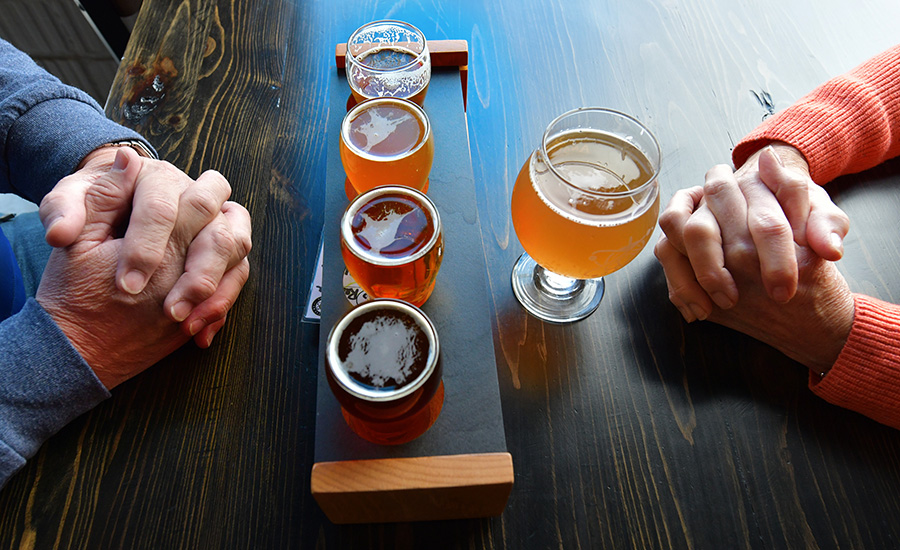Craft breweries are no longer just a big-city thing, as they’ve become economic drivers all over downstate Illinois
The craft-beer craze that’s been underway so far this century shows no signs of abating around central Illinois.
From Macomb to Fairbury, at least 20 craft breweries are pouring handmade suds to those with discerning palates. Or to newbies who want to experiment beyond Bud Light.
Of course, alcohol production in Peoria is nothing new. Gipps and Leisy were mass-producing beer here by the end of the 19th century. Until 1982, Pabst operated one of the nation’s largest breweries in Peoria Heights.
Beermaking resumed in Peoria in earnest in 1998, when John S. Rhodell Brewery opened on Peoria’s riverfront. It remains the granddaddy of them all hereabouts, but today it has plenty of company with more to come.
Bust’d Brewing soon will make the first beer in the Heights since Pabst left. Ottawa-based Tangled Roots has plans for a brewery and restaurant on Washington’s Downtown Square. Funky Brew is under development in Gridley, a village of about 1,400 located 40 miles east of Peoria.
Clearly, brewing is not just a big-city thing anymore. Here’s a look at three craft breweries in central Illinois that have become economic drivers in their communities.
Destihl Brewery, Normal
Matt Potts still is licensed to practice law, but it’s not where his passion lies.
The evidence of that now can be found in 38 states. That’s the footprint of Destihl Brewery, the company Potts founded in 2007 in Normal, which has grown to about 175 employees, a restaurant, beer hall and robust product line of mainstream and specialty brews.
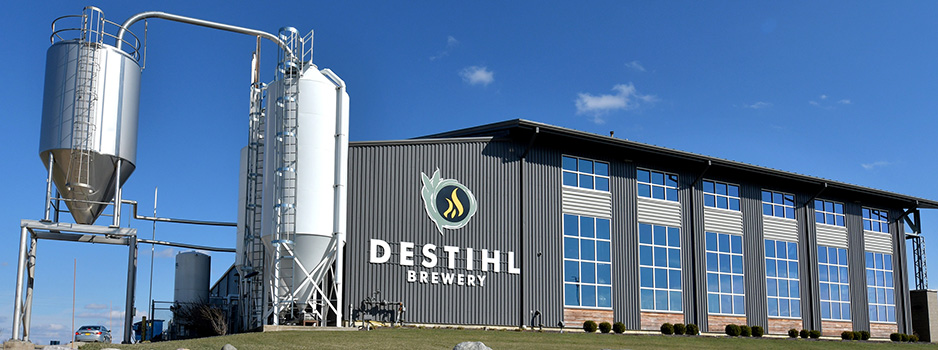
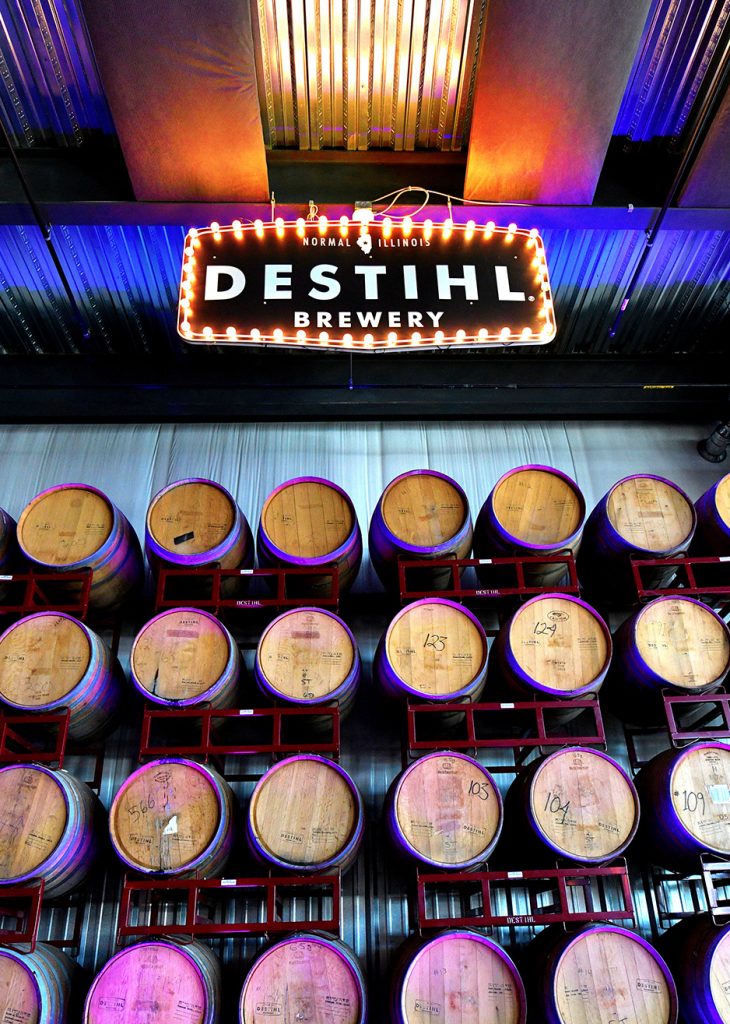
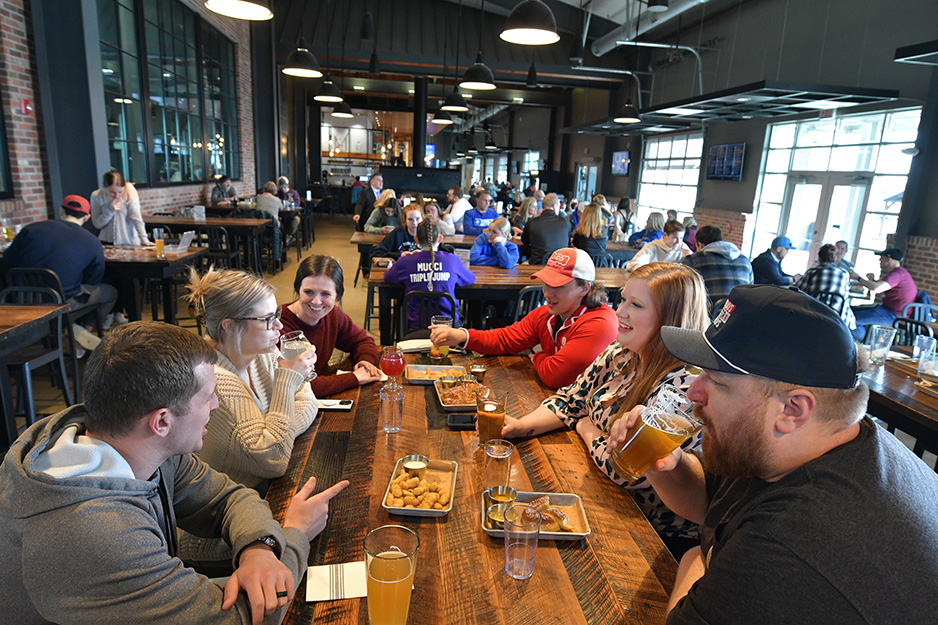
“You can always dream big when you’re in this business,” Potts said, “but I would say this would far exceed that.”
Potts’ craft-beer journey began innocently in the 1990s after the Williamsfield-area native came home from law school and joined the family legal practice in Elmwood. He and his wife, Lyn, had lunch one day at Landmark Café & Creperie in Galesburg. Potts ordered an Anchor Steam Beer from California, one of the early mass-produced craft brews.
“That was probably the first beer I had that had awesome hop character and a little more bitterness to it,” Potts said. “It sparked my interest in beer in a different way, rather than just enjoying it. It was kind of a turning point.”
Potts became a homebrewer. That blossomed into Elmwood Brewing Co., which opened in 2001 in a restored building on that community’s downtown square. Potts juggled beermaking with his law practice, but the suds proved more appealing than the summonses.
Developer Diane Oberhelman gave Potts a chance to focus on beer full-time. In the mid-2000s, she approached him about starting a brewpub at a Normal shopping center she was developing. Potts enrolled at a brewing school in Chicago to sharpen his skills, and Destihl Restaurant & Brew Works opened in November 2007.
What followed was praise for Destihl’s beer and food, the opening of a beer hall/production facility in 2017, and then the mass production and canning of its widely praised wild sour series.
“We were probably one of the first breweries in the country to put sour beer in a can, which at that point in time was sacrilegious,” Potts said. “It kind of made sours more accessible and certainly a higher volume of product … It created a huge niche for us.”
The sours and success at the annual Great American Beer Festival in Denver put Destihl on the national map. Connecticut, Kentucky and Virginia were added this year. That growth helped Destihl survive the COVID-related shutdown of its restaurants. Package-beer sales soared during the pandemic, said Potts, whose businesses had endured tough times before. The Elmwood brewpub opened just after the Sept. 11 attacks, Destihl just before the Great Recession.
“There’s a national tragedy or local tragedy every time we open something,” joked Potts, who’s learned to keep his feet on the ground. He still does all the legal work for the brewery.
“Obviously, it was tough to leave the family law practice,” Potts said, “but you have to pursue your passion in life.”
Analytical Brewing, Lexington
Unlike many rural communities, Lexington isn’t dying on the vine. It’s growing, if not by leaps and bounds then by hops and barley.
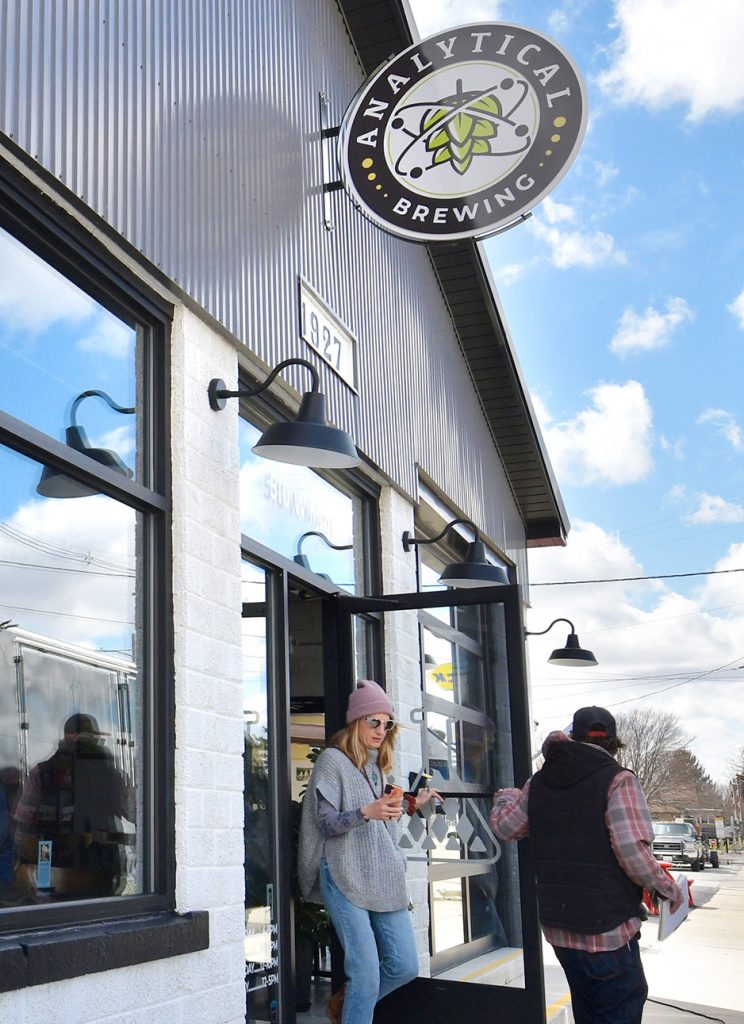
The city of 2,100 residents located 15 miles northeast of Bloomington-Normal has increased in population with every Census count since 1960. It’s become something of a foodie destination, between the refined bar food at Kemp’s Upper Tap and the seasonal, locally sourced ingredients at Lexington Social.
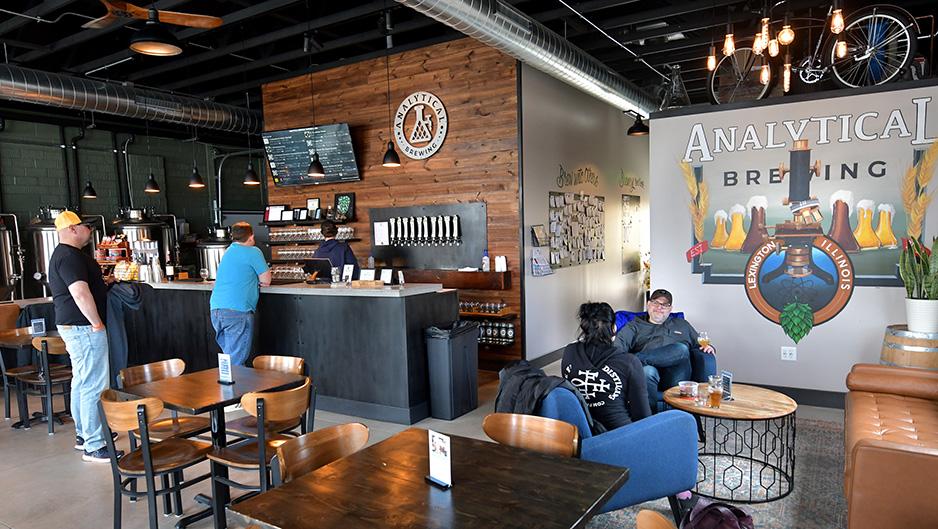
Into that mix last June came Analytical Brewing, owned by three McLean County homebrewers/friends and their wives: Andrew and Heather Arndt, Brian and Samantha Graves, and Nathan and Stacy Poehlman.
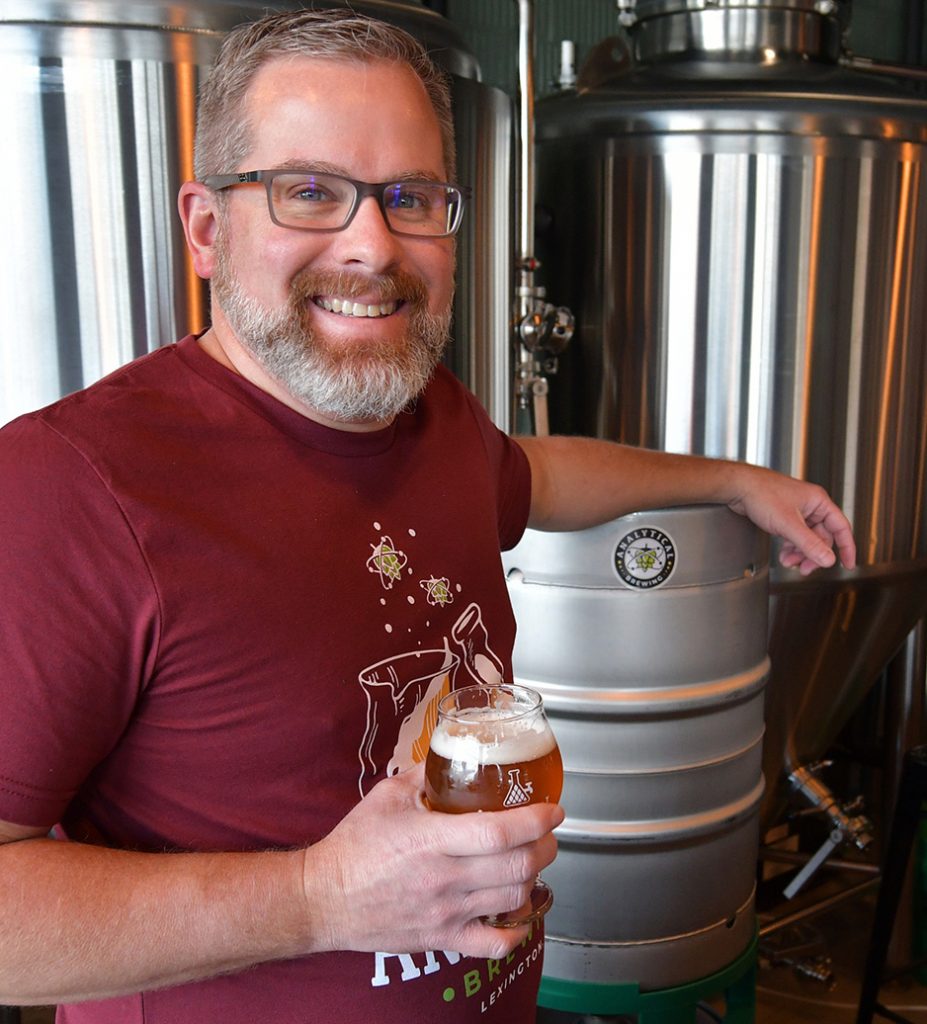
Lexington Mayor Spencer Johansen helped Analytical’s owners find a suitable building in town. Their presence on Main Street is the realization of a vision Johansen had after his daughter moved to Richmond, Va.
“When we were first going out there, we got to go to different breweries and I said, ‘Man, we could make this work in Lexington on a smaller scale,’” Johansen said. “When they approached me, it was like, ‘This is meant to be.’”
Brian Graves had the same feeling.
“We had always kind of had our eyes toward Lexington,” he said. “We just really liked the town, liked the direction the town was going.”
Graves and his partners still have day jobs. He and Nathan Poehlman work in insurance, and Andrew Arndt is a chemist (hence the brewery’s name) for a Decatur company. But so far, the beer business — Analytical focuses on ales — hasn’t been too shabby.
“Honestly, you didn’t know what to expect,” Graves said. “We weren’t as known in the homebrewing community as maybe some people are when they set out on this journey … We didn’t already have this built-in following.
“From the moment we opened the doors … people were coming out, enjoying the space, enjoying the beer, and that’s really continued.”
It has been a win-win for Analytical and Lexington. “It brings some new faces to town,” said Johansen. “The brewing industry has really stepped up over the past 10 years. I think when people come to town that haven’t been to Lexington before, they drive down Main Street and see what else we have to offer.”
The brewery also might have changed Johansen’s flavor palate.
“I wasn’t a big craft-beer drinker. I was always the old Miller Lite guy,” Johansen said with a chuckle. “But they’ve got me sold.”
Reserve Artisan Ales, Galesburg
When visitors arrive at Reserve Artisan Ales in downtown Galesburg, it’s impossible for them to miss the bus. Or the beer.
The centerpiece of the Reserve taproom, which opened in January 2022, is the restored shell of a 1960s-era Peoria transit-system bus. Blake Benedict, who with brother Trent co-owns Reserve, said his family found the bus in a junkyard in Kickapoo.
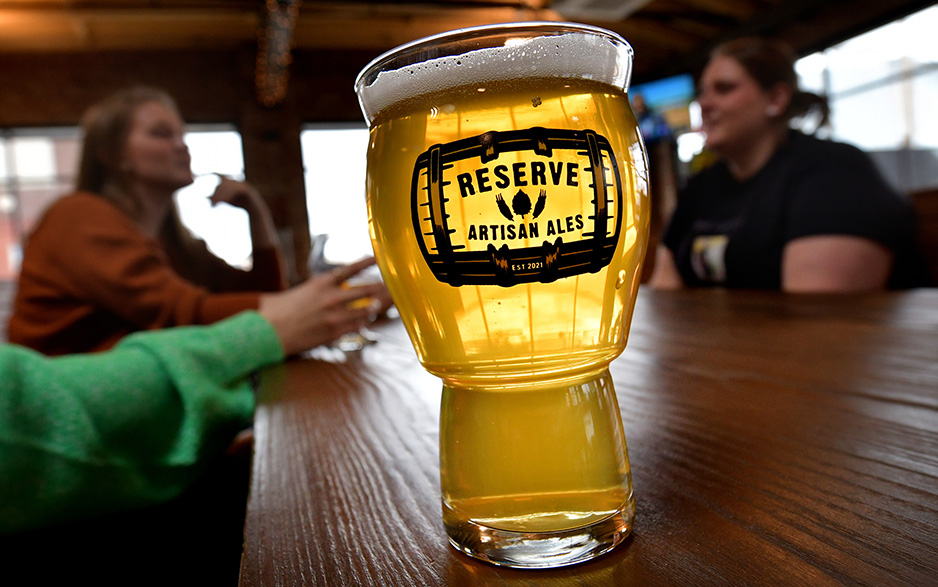
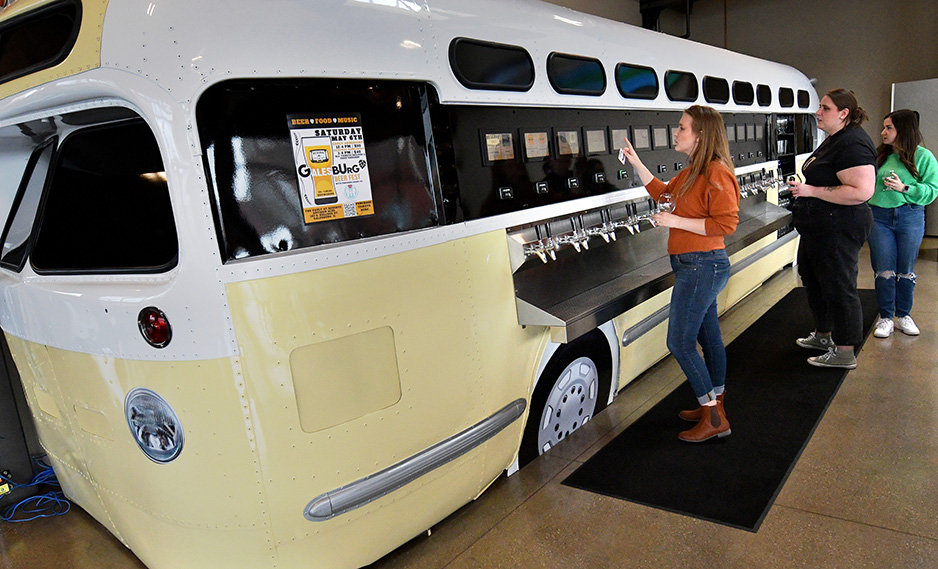
“My father said, ‘I think this would be awesome in the taproom.’ I looked at him, looked at it and said, ‘Yeah, right,’” Benedict said. “Over time, we started working on it. It used to be extremely rusty and in pretty bad shape.”
Now, the gleaming bus covers 30 taps from which Reserve pours its beverages, although it’s more accurate to say customers do the pouring, as much or as little as they want. Indeed, Reserve has hopped on the pour-your-own bus that’s been making a lot of stops throughout central Illinois. One such is Pour Bros. Craft Taproom in Peoria Heights.
But Reserve’s version has a twist. It’s a self-pour place that brews its own beer.
Customers activate the Reserve taps by using cards embedded with radio-frequency identification chips. Beers are priced by the ounce, and the card keeps track.
“Once people get past that initial … intimidation factor,” said Benedict, “they love it.”
About half the taps are beers Benedict brews. The rest are produced elsewhere, along with some cider and wine.
Benedict spent three years as a brewer at Iron Spike Brewing Company, located about two blocks west of Reserve, before deciding to go out on his own. His family long has owned the 18,000-square-foot building that houses the brewery and The Vault, an adjacent wedding and event venue.
Among the previous tenants was Mechanical Service Inc., the Benedict family HVAC and plumbing business.
“We were at the point of ‘What are we going to do with it?’” Blake Benedict said. “There’s a lot of space there. We were able to figure out we’d have space for receptions. We pulled the trigger on doing a brewery, too.”
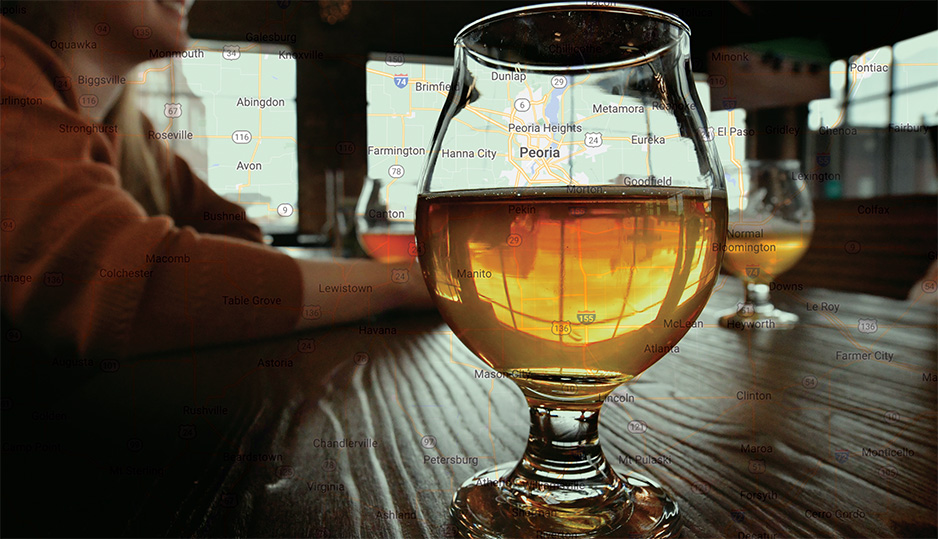
Central Illinois Breweries
Analytical Brewing
510 W. Main St., Lexington (309) 490-1029
Bearded Owl Brewing
112 State St., No. 1A, Peoria (309) 713-3676
Casper Brewing Company
3807 Ballybunion Rd., Bloomington (260) 227-7377
Cherry Street Brewing Company
57 S. Cherry St., Galesburg (309) 344-4480
Destihl Brewery and Beer Hall
1200 Greenbriar Dr., Normal (309) 420-0159
Destihl Restaurant & Brew Works
318 S. Towanda Ave., Normal (309) 862-2337
Emancipation Brewing Company
13113 N. 2500 East Rd., Fairbury (815) 419-5278
Evergreen Farm Brewing
1179 Douglas Rd., Metamora (309) 250-1858
Fiala Brothers Brewery & Beer Hall
127 E. Beaufort St., Normal (309) 808-2221
Forgottonia Brewing
324 N. Lafayette St., Macomb (309) 237-8649
Hand of Fate
107 E. Douglas St., Petersburg (217) 691-1098
Industry Brewing Co.
8012 N. Hale Ave., Peoria (309) 839-2930
Iron Spike Brewing Company
150 E. Simmons St., Galesburg (309) 297-4718
Keg Grove Brewing Company
712 E. Empire St., Bloomington (309) 585-2021
Lil Beaver Brewery
5 Finance Dr., Bloomington (309) 808-2590
Obed & Isaac’s Microbrewery and Eatery
321 NE Madison Ave., Peoria (309) 306-0190
Patton Block Grill & Brew Pub
88 Public Square, Monmouth (309) 715-7180
Reserve Artisan Ales
185 S. Kellogg St., Galesburg (309) 541-1010
Rhodell Brewery
100 Walnut St., No. 111, Peoria (309) 966-1047
Tangled Roots Brewing Company
812 LaSalle St., Ottawa (815) 324-9549
White Oak Brewing
1801 Industrial Park Dr., Normal



